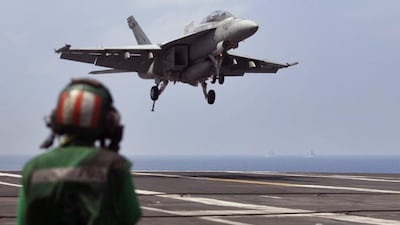Henry Kissinger, America's realist-in-chief, has inserted himself into the expanding civil war in Syria with an essay in The Wall Street Journal arguing that the US needs a new strategy in the region.
That, at least, is undeniable. The Syrian civil war has exposed how dangerous America’s hands-off and piecemeal approach to the Middle East is – not merely for the Arabs, of course, but for Europe as well.
Mr Kissinger’s essential point in the essay is that the fate of ISIL matters more to America’s interests in the region than any other element of the geopolitical jigsaw.
The way Mr Kissinger reads the tea-leaves, Bashar Al Assad can stay in (some form of) power in Syria, Iran can continue to exert force across the region (as long as it does so through conventional arms, not assymetric power), and Russia can continue to bomb Syrians (and even squat on Syrian land, as long as it is land vacated from ISIL).
In other words, everything that has already occurred or is likely to occur can still be part of America’s “plan”. That includes everything the US has been powerless to stop up until now.
For a strategist famed for taking a long view of politics, this is curiously short-sighted. Mr Kissinger, who has always had a rather exaggerated idea of what US power can achieve abroad, appears to have abdicated the ability of the US to act decisively in a complex Middle East. Rather, he is counselling America’s leaders to simply manage its declining footprint, mouthing the right platitudes as they head to the exit.
Mr Kissinger counsels that a “strategic concept” is needed for the region, rather than dealing with “tactical expedients”. But as those who lived through his experiments in policy in Vietnam can testify, too often his ideas are about what should be done to the region, rather than with it.
Take Syria. Nowhere when discussing his suggestion of a federal system does he deal with justice. Splitting the Alawite and Sunni regions, he writes, would “reduce the risks of genocide”. He is silent on what should happen to the architects of the current genocide of Syrians, or whether millions of Syrians, having been displaced, raped, had their families slaughtered and their cities barrel-bombed, could accept a role for Mr Al Assad. (Here’s a hint: they won’t.)
Or take what he believes should be the stance of the US towards its traditional allies in the Sunni Gulf Arab states. His suggestion is to “implement the military assurances” previously offered before the Iran deal was signed. But the Gulf has not been passively waiting these past few months for America’s “reassurance”. The foreign policy train has left the station. Gulf military power has been projected north and south of the GCC. A new era has begun, even before Mr Kissinger has described it.
He does, however, accurately identify one of the root causes of America’s indecision. “At question,” he writes, “is not the strength of American arms but American resolve ... in mastering a new world.” Yet he doesn’t expand the point.
Today, it is unknown whether America has the will to project its traditional role in the region. In other words, is Barack Obama’s weakness merely temporary, limited to one American president, or is it now a permanent feature of the world?
Has the US, bruised by two inconclusive wars and battered by a deep recession, become unwilling to go on as it did before?
This is not merely a question for one region. Because America’s rivals are not waiting for the country to, as Mr Kissinger puts it, “decide for itself the role it will play”. They are already in the game.
Russia has taken advantage of US weakness in three major theatres: in eastern Europe, over Georgia and Ukraine, in the Middle East today over Syria and Iraq, and in Central Asia, where last year the US was forced to vacate its last remaining military base in the region.
The same is happening in east Asia, where China is expanding its presence in the South China Sea.
In the Middle East, America’s rivals have not waited to discover what role the US wants – they have instead spent the time carving out roles for themselves. Even America’s allies have given up waiting.
The truth is that America will not be able to find a way out of the Middle East’s chaos until it decides whether it is in fact willing to lead.
Henry Kissinger is right that America is searching for a role in the world. The question is whether it has the will for one anymore.
falyafai@thenational.ae
On Twitter: @FaisalAlYafai


